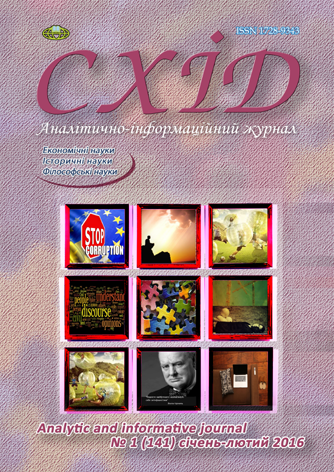Implementation of rational choice theory to the analysis of events in Ukraine 2013-2016
DOI:
https://doi.org/10.21847/1728-9343.2016.1(141).64815Keywords:
sociology of religion, rational choice theory, religiosity, conflictAbstract
The theory of rational choice of religion became one of the leading for scientific world, by total changing paradigm of postsecular sociology of religion. But its critics does not give to us any possibility apply it fully to non-american societies, and also analyze the impact of social factors on perception of religion personally and by collective. The problem is taking into account many other factors that also have a place in modern forms of conflict. Consideration of this theory in a context of latest events in Ukraine 2013-2016 gives us possibility to look on perspectives of its implementation.
A more detailed analysis shows the lack of a theory to explain the multifaceted conflict that is present in Ukraine, what means that researcher need more theoretical background to explain new phenomena. The presence of religious component in a social and political conflict creates more difficult conditions for in-depth analysis and finding root causes of primary conflict. Still theory of rational choice of religion explains part of the trends that emerged two years ago and continue to develop in the Ukrainian society. Since the first revolution and later open armed conflict led to the transition of society in another dimension, placing new challenges and tasks, but bared old problems and latent conflicts, especially in religious organizations and groups.Downloads
References
Bruce S. (1999), Choice and Religion: A critique of Rational Choice Theory, Oxford University Press, 359 p. (eng).
Hadden J. (1987), Toward Desacralizing Secularization Theory, Social Forces, № 65, p. 587-611 (eng).
Jerolmack Colin, Porpora Douglas(2004), Religion, Rationality and Experience: A response to the new rational choice theory of religion, City University of New York Graduate Center, р. 140-157 (eng).
Sharot S. (2002), Beyond Christianity: A critique of the rational choice theory of religion, Sociology of Religion. ProQuest Social Sciences Premium Collection, 63:4, p. 428-450 (eng).
Stark R., Iannacone L. (1994), A supply-side reinterpretation of the secularization of Europe, Journal for the scientific study of religion, № 33, p. 230-252 (eng).
Stark R., Finke R. (2000), Acts of faith: Explaining the human side of religion, Berkeley University of California Press (eng).
Stark R., Iannacone L., Finke R. (1996), Religion, Science and Rationality, The American Economic Review, Vol. 86, No. 2, p. 434-437 (eng).
Bilokobylsky O., Levytskyi V. [Ed.] (2015), Watersheds of secularization, «Nilan LTD» Publisher, Vinnytsia, 240 p. (ukr).
The WCC condemned the changes to the code of labor laws on «gender identity» and «sexual orientation» (2015), available at: http://risu.org.ua/ua/index/all_news/community/religion_and_society/61734/.
Rutkiewich E. (2013), «New paradigm» in the sociology of religion: Pro and Contra, Bulletin of the Institute of Sociology, № 6, p. 207-233 (rus).
Habermas Jurgen (2008), Post-secular society - what is it?, available at: http://www.gumer.info/bogoslov_Buks/Philos/Haberm/Ver_Znan.php.
The Church is the leader of Ukrainian public confidence - survey (2016), available at: http://www.irs.in.ua/index.php?option=com_ content&view=article&id=1639%3A1&catid=34%3Aua&Itemid=61&lang=uk.
Downloads
Published
How to Cite
Issue
Section
License
Copyright (c) 2016 Tetiana Kalenychenko

This work is licensed under a Creative Commons Attribution-NonCommercial-NoDerivatives 4.0 International License.
1. Authors bear responsibility for the accuracy of facts, quotations, numbers and names used.
2. Manuscripts are not sent back.
3. The publisher does not always agree with the authors' opinion.
4. The authors reserve the right to authorship of the work and pass the first publication right of this work to the journal under the terms of a Creative Commons Attribution-NonCommercial-NoDerivatives 4.0 International License. This license allows others to distribute (copy) the published work for non-commercial purposes, provided there is mandatory attribution to its authors and a link to the first publication in our journal.
5. The authors have the right to conclude separate supplement agreements that relate to non-exclusive work distribution in the form in which it has been published by the journal (for example, to upload the work to the online storage of the journal or publish it as part of a monograph), provided that the reference to the first publication of the work in this journal is included.

